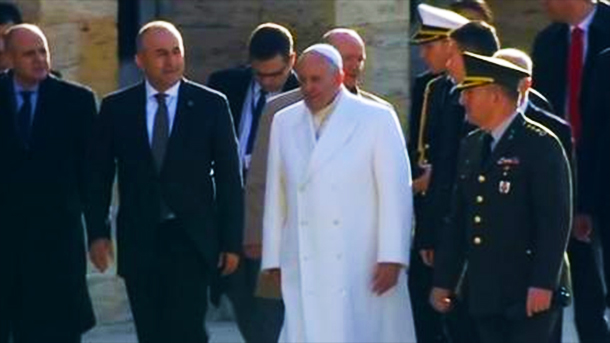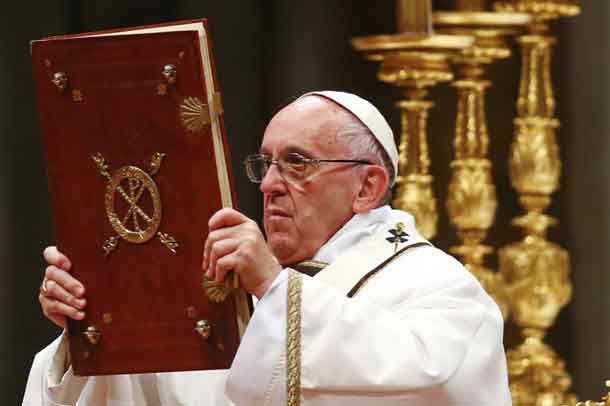Pope Francis Meets with Muslim Leaders
VATICAN CITY – Religion – Pope Francis is on a delicate mission to strengthen ties with Muslim leaders in Turkey.
En route to Ankara, he acknowledged Turkey’s role in assisting war-weary refugees from neighboring Iraq and Syria.
“Turkey at this moment is the witness, and it is the one that helps so many refugees from the conflict areas,” stated the Pontiff.
Pope Francis has repeatedly condemned violence against minorities in the Middle East.
Religious tolerance and the fight against extremism are expected to be high on the agenda of his three-day trip, and discussions with President Tayyip Erdogan.
Turkey is sheltering close to two million refugees from Syria, driven from their homes by Islamic State insurgents.
And though Pope Francis has said it’s “almost impossible” to have a dialogue with the militants, he says the door should not be shut. And he says Turkey has a vital role to play.

Pope Francis began the sixth apostolic trip of his pontificate. His visit to Turkey is essentially of an ecumenical nature, like those of his predecessors; the country has occupied a privileged position in the geography of papal trips ever since the visit of the Apostolic Delegate Angelo Roncalli, referred to by the Turkish authorities as “the first Turkish pope in history” following his election as Pope John XXIII. Turkey was also the destination of Paul VI’s fifth apostolic trip in 1967, a corollary of his pilgrimage to the Holy Land and his historic embrace with the Ecumenical Patriarch Atenagoras in Jerusalem. John Paul II continued the tradition with his fourth trip (1979) as did Benedict XVI with his fifth apostolic trip, in 2006.
The Holy Father departed from Rome’s Fiumicino airport at 9 a.m., and reached the Turkish capital Ankara at 1 pm (local time) where he was received by the civil and religious authorities. He transferred by car to the mausoleum of Mustafa Kemal Ataturk, founder and first president of the Turkish Republic, the “Father of the Turks” who guided Turkey’s radical rupture with its Ottoman past, laying down the foundations of the modern secular state in its 1937 Constitution. Upon arrival the Pope was received by the Commander of the Guard, ascended the Steps of Honour, left a floral tribute and prayed for a moment. He was then accompanied to the nearby “Tower of National Pact”, where he signed the guest book.
He then paid a visit to the Presidential Palace or “Ak Saray” (White Palace), inaugurated just two months ago by President Recep Tayyip Erdogan and substituting the historic Cankaya Palace. The Holy Father was received by the president, and the two spoke in private for a few minutes, after which Pope Francis gave his first public address on Turkish soil, addressed to the authorities gathered in the Ak Saray.
“I am pleased to visit your country so rich in natural beauty and history, and filled with vestiges of ancient civilisations. It is a natural bridge between two continents and diverse cultures”, the Pope began. “This land is precious to every Christian for being the birthplace of Saint Paul, who founded various Christian communities here, and for hosting the first seven Councils of the Church. It is also renowned for the site near Ephesus which a venerable tradition holds to be the ‘Home of Mary’,the place where the Mother of Jesus lived for some years. It is now a place of devotion for innumerable pilgrims from all over the world, not only for Christians, but also for Muslims.
“Yet, the reasons why Turkey is held with such regard and appreciation are not only linked to its past and ancient monuments, but also have to do with the vitality of its present, the hard work and generosity of its people, and its role in the concert of nations. It brings me great joy to have this opportunity to pursue with you a dialogue of friendship, esteem and respect, in the footsteps of my predecessors Blessed Paul VI, Saint John Paul II and Benedict XVI. This dialogue was prepared for and supported by the work of the then apostolic delegate, Angelo Giuseppe Roncalli, who went on to become Saint John XXIII, and by the Second Vatican Council”.
The Pope reiterated the need for a dialogue to “deepen the understanding and appreciation of the many things which we hold in common. Such a dialogue will allow us to reflect sensibly and serenely on our differences,and to learn from them. There is a need to move forward patiently in the task of building a lasting peace, one founded on respect for the fundamental rights and duties rooted in the dignity of each person. In this way, we can overcome prejudices and unwarranted fears, leaving room for respect, encounter, and the release of more positive energies for the good of all”.
Therefore, “it is essential that all citizens – Muslim, Jewish and Christian – both in the provision and practice of the law, enjoy the same rights and respect the same duties. They will then find it easier to see each other as brothers and sisters who are travelling the same path, seeking always to reject misunderstandings while promoting cooperation and concord. Freedom of religion and freedom of expression, when truly guaranteed to each person, will help friendship to flourish and thus become an eloquent sign of peace.
“The Middle East, Europe and the world all await this maturing of friendship. The Middle East, in particular, has for too long been a theatre of fratricidal wars, one born of the other, as if the only possible response to war and violence must be new wars and further acts of violence. How much longer must the Middle East suffer the consequences of this lack of peace? We must not resign ourselves to ongoing conflicts as if the situation can never change for the better! With the help of God, we can and we must renew the courage of peace! Such courage will lead to a just, patient and determined use of all available means of negotiation, and in this way achieve the concrete goals of peace and sustainable development”.
Addressing the president, the Pope reaffirmed that “interreligious and intercultural dialogue can make an important contribution to attaining this lofty and urgent goal, so that there will be an end to all forms of fundamentalism and terrorism which gravely demean the dignity of every man and woman and exploit religion. Fanaticism and fundamentalism, as well as irrational fears which foster misunderstanding and discrimination, need to be countered by the solidarity of all believers. This solidarity must rest on the following pillars: respect for human life and for religious freedom, that is the freedom to worship and to live according to the moral teachings of one’s religion; commitment to ensuring what each person requires for a dignified life; and care for the natural environment. The peoples and the states of the Middle East stand in urgent need of such solidarity, so that they can ‘reverse the trend’ and successfully advance a peace process, repudiating war and violence and pursuing dialogue, the rule of law, and justice.
“Sadly, to date, we are still witnessing grave conflicts. In Syria and Iraq, particularly, terrorist violence shows no signs of abating. Prisoners and entire ethnic populations are experiencing the violation of the most basic humanitarian laws. Grave persecutions have taken place in the past and still continue today to the detriment of minorities, especially – though not only – Christians and Yazidis. Hundreds of thousands of persons have been forced to abandon their homes and countries in order to survive and remain faithful to their religious beliefs.
Turkey, which has generously welcomed a great number of refugees, is directly affected by this tragic situation on its borders; the international community has the moral obligation to assist Turkey in taking care of these refugees. In addition to providing much needed assistance and humanitarian aid, we cannot remain indifferent to the causes of these tragedies. In reaffirming that it is licit, while always respecting international law, to stop an unjust aggressor, I wish to reiterate, moreover, that the problem cannot be resolved solely through a military response. What is required is a concerted commitment on the part of all, based on mutual trust, which can pave the way to lasting peace, and enable resources to be directed, not to weaponry, but to the other noble battles worthy of man: the fight against hunger and sickness, the promotion of sustainable development and the protection of creation, and the relief of the many forms of poverty and marginalisation of which there is no shortage in the world today”.
The Pope concluded, “Turkey, by virtue of its history, geographical position and regional influence, has a great responsibility: the choices which Turkey makes and its example are especially significant and can be of considerable help in promoting an encounter of civilisations and in identifying viable paths of peace and authentic progress. May the Most High bless and protect Turkey, and help the nation to be a strong and fervent peacemaker”.
Video by Reuters





